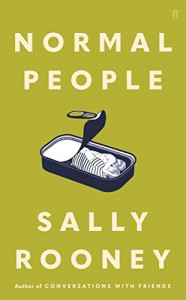Two young people struggle with fitting into the world.

Normal People, Sally Rooney, author; Aoife McMahon, narrator I think one has to ask oneself what is normal after reading this book. How does one determine if they are ostracized because they don’t fit in, or they are ostracized because the world is filled with bullies who reject you if you don’t fit into their mold. A square peg in a round hole always has a harder time. Often greed and jealousy separate people. A particular skill, intellectual or athletic, divides us. If these don’t divide us, class will surely separate us into different neighborhoods and schools. Through no fault of their own, but rather due to their circumstances, Marianne and Connell become confidants and then lovers who struggle to survive in society. Their relationship is secret, at first. They live in two different worlds. Marianne is rich. Connell’s mother, Lorraine, is her family’s housekeeper. Marianne has a summer home in Trieste, Italy. Connell stays in hostels when he travels. The author has gotten into the heads of these two teenagers, and she follows them for four years as they mature, reverse rolls, face challenges and deal with life. Marianne is dealing with the loss of her own father, a stepfather who is jealous of her brilliance, and a brother who is abusive and always taunting her. Her home is fraught with dysfunction. Her mother dislikes her, as well, so she convinces herself that it is her fault that she is unlikable. It is not the other family members that are outcasts, it is she. She has few friends in high school because she keeps herself apart and distant. Connell is from the other side of the tracks. His mother is the housekeeper for Marianne’s family. He is a soccer star, and is, therefore, popular, but he doesn’t understand why. Both are in high school and they become fast friends when they discover that each, in their own head, has difficulty fitting in for a variety of reasons. They can’t figure out their own feelings or the feelings of others toward them. As confidants of each other, they guide each other through the next period of their lives, sharing moments, vacations and friends. Sometimes, the mix is not pleasant. Because of mixed signals, although they had once been intimate, they each take a new significant other. However, although they were the best of friends, and did share their innermost thoughts with each other, that no one else knew, they still held back some of their feelings and thoughts. Each is searching for something, possibly unattainable. When he was able to move away, Connell packed up. He became serious with a medical student, but soon realized he still didn’t fit in. After a friend’s suicide, he became despondent. He was guilt ridden because he felt he had abandoned him years before. He broke up with his girlfriend and was terribly lonely. He sank into deeper depression and moved back to his mother’s house. Meanwhile, Marianne had also moved away. Although she had become more secure and was very social, when she and her boyfriend split up, many of their friends abandoned her. She began to feel once more that there was something wrong with her, that she was unlovable. She soon began a relationship with an abusive artist and grew thinner and thinner as she despaired about her own situation and believed she deserved to be punished. She too moved back home to her family home. Soon, Marianne and Connell reconnect in some fashion, but both are still searching as they rescue each other from their depths of sadness and confusion. Again, the reader will wonder, who is normal? Were Marianne and Connell simply rejected by society because they were a little different, or did they reject society because they felt different and were ostracizd because they pushed people away. Were the people who mistreated them normal? Was their mistreatment of others normal or deserved? Marianne felt that she was unlovable because of how she had been treated at home and she made herself remain distant and cold. She had a family, but felt unloved. Connell was well loved but he was fatherless and wondered if his mother was sorry she had him, even though reiterated her love or him, often. Both Marianne and Connell questioned the idea of love in all its forms. Neither character could find a place where they were comfortable unless it was with each other. Was it a matter of maturity? Was it the environment that made them suffer the slings and arrows of society? When both got full scholarships, one felt she was finally legitimized, and the other finally felt free from money worries for at least the next four years. Although they were very close, neither truly understands how the other really feels. Neither one had the insight to interpret the other’s responses. There were so many moments of misinterpretation leading to friction and spontaneous, thoughtless reactions affecting their lives. The novel is about perception of others toward you and you toward others. People were drawn to him and away from her. Neither understood why this is so. The timeline of the novel is sometimes confusing as anecdotal incidents are described and although it is in the current day, there are moments described that seem to be of an earlier age, like hanging laundry. Both of the characters seem unable to feel secure and to feel they fit in wherever they are. However, the book is a fast read; it is interesting, but dark and often depressing. There is violence, as well as sex, but they are both handled deftly and are not included for effect, but rather because it is pertinent to the plot and/or other themes about closeness and tolerance, self image and self esteem.


